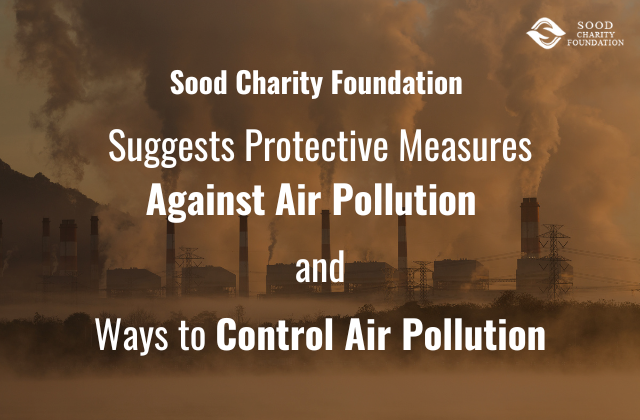
Sood Charity Foundation Suggests Protective Measures Against Air Pollution And Ways to Control Air Pollution
With the Industrial Revolution at its peak, we have benefitted from it in many ways, but we should not be blissfully unaware of what it is costing us. We and our subsequent generations are paying a very heavy price for it with its deteriorating effects on air quality and our lung health.
Air pollution is increasing at an exponential rate due to many reasons like burning of fossil fuels, Industrial Emissions, Wildfires, Transportation, Open Burning Of Garbage and many more..
With increasing air pollution awareness there is an open dialogue happening in context to prevention of air pollution and control measures of air pollution. When people with a following and influence talk about issues like this, a positive impact is noticed.
Lately, Our very own son of ther soil, Sonu Sood tweeted about protective measures against air pollution through the Sood Charity Foundation handle. Using hashtags like #takeactiontuesday, #airpollutionawareness, #letsbreathefreshair and #stopairpollution, the tweet resonated with many.
Protecting your lung health is crucial for overall well-being. Here are some tips to do it:
Stay Informed:
Be aware of the local air quality reports and forecasts. There are numerous websites and apps that provide real-time air quality updates for specific areas.
Limit Outdoor Activities on Poor Air Quality Days:
This is where awareness can help you. On days when air quality is poor and the Air Quality Index reads above 150, try to limit your outdoor activities. Sensitive and vulnerable groups such as children, the elderly, and individuals with respiratory conditions should take precautionary measures when AQI is 100. Step out only if you have to and wear masks.
Use Air Pollution Control Devices:
Consider investing in air purifiers in your home and workplaces as we spend the major portion of our day here. High-efficiency particulate air (HEPA) filters are cost- effective substitutes that can also help remove fine particles from the air.
Create a Clean Indoor Environment:
Maintaining cleanliness and ventilation are basic measures to control air pollution indoors. Kick vicios habit of smoking for good and minimise other indoor pollutants such as cooking fumes and cleaning chemicals. Planting indoor plants like Snake plant, Peace Lily, Bamboo Palm and Aloe Vera also will have a positive effect on air pollution levels.
Wear Masks:
In areas with high levels of air pollution like metropolitan and industrial cities, wearing masks especially designed to filter out particles and provide a physical barrier and reduce the inhalation of harmful substances are highly recommended.
Stay Hydrated:
Drinking plenty of water and fluids helps the body to flush out toxins and keep the respiratory system functioning optimally. Drinking concoctions like warm water with honey are also known to benefit many.
Eat a Healthy Diet:
Importance of having a balanced diet which is rich in fruits, vegetables, and antioxidants is reiterated by its positive impact on your lung health.
Exercise Indoors:
Exercising and being outdoors in fresh air is highly recommended but a word of caution for days when outdoor air quality is poor, consider exercising indoors. If at all you have to exercise outdoors, try to do so in the early morning or late evening when pollution levels may be lower.
Avoid High-Traffic Areas:
Whenever possible, avoid busy roads and areas with heavy traffic, as these tend to have higher concentrations of pollutants due to vehicular emissions.
Quit Smoking:
Quitting smoking is one of the best things you can do for your lung health. Smoking significantly increases the risk of respiratory diseases and worsens the effects of air pollution.
Consult a Healthcare Professional:
If you suffer from any respiratory conditions or experience persistent respiratory symptoms, consult a healthcare professional for advice and get regular check-ups done.
Please take note that these tips are general guidelines. If you have specific health concerns or conditions, it’s essential to consult with a healthcare professional.
Jai Hind.

